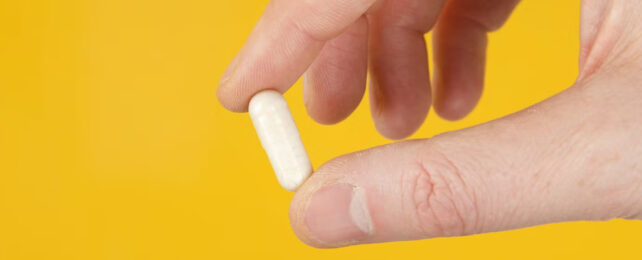The placebo effect is wild. Taking a sugar pill with no active medical ingredients can somehow trigger a psychedelic reaction in some people, if that's what they're expecting.
Even more incredibly, placebos can work when people aren't being deceived too – when they know what they're taking isn't medication. In a new study, psychologists show this strange phenomenon can be leveraged as a simple way to reduce stress, at least in the short term for moderate levels of distress.
"Exposure to long-term stress can impair a person's ability to manage emotions and cause significant mental health problems," explains psychologist Jason Moser from Michigan State University (MSU).
"So we're excited to see that an intervention that takes minimal effort can still lead to significant benefits."
MSU psychologist Darwin Guevarra and team prescribed a placebo for a group of 32 volunteers and offered no treatment to another group of 32 people.
The 64 participants all reported experiencing prolonged stress during the COVID-19 pandemic. Their stress levels, anxiety, and depression were measured before, in the middle, and at the end of the two-week trial.
The catch was, the placebo group knew they were getting pills with no active ingredients. They were instructed to take the inert plant fiber pills twice a day and had to fill out a pill-taking adherence survey daily.
Incredibly, those taking the placebo still had a decrease in stress, anxiety, and depression compared to the no-treatment group, despite knowing what they were taking was just a placebo.
As the sample size was small in this case, Guevarra and colleagues caution that more work needs to be done to see if the results hold true across different cultures and age groups and for longer time periods.
How this fascinating brain trickery works is not yet fully understood.
"Our data suggest that the effects of non-deceptive placebos on affective outcomes cannot be solely attributed to explicit expectations," Guevarra and team write in their paper.
"Other researchers have suggested that non-deceptive placebos may work through mechanisms such as implicit expectations, conditioning from prior experience with active treatment, and embodied cognition."
Whatever the exact mechanisms, the researchers suggest using a placebo to treat people experiencing moderate stress may help prevent them from deteriorating into more severe conditions.
"Remotely administered non-deceptive placebos have the potential to help individuals struggling with mental health concerns who otherwise would not have access to traditional mental health services," Guevarra points out.
"This ability to administer non-deceptive placebos remotely increases scalability potential dramatically."
Other researchers argue there's not enough evidence to use placebos for treatments yet, as studies like these that support their effectiveness are small and too short-term.
This makes placebos perfect for use as a control in clinical trials to help eliminate biases, but more extensive research is required to confirm their therapeutic value.
This research was published in Applied Psychology: Health and Well-Being.
